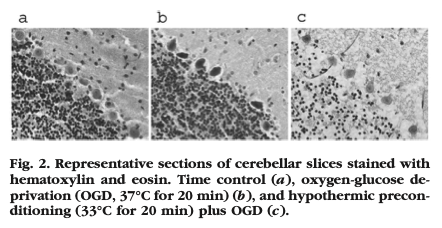Glutamate Release and Free Radical Production Following Brain Injury: Effects of Post traumatic Hypothermia
Mordecai Y.-T. Globus, Ofelia Alonso, W. Dalton Dietrich, Raul Busto, and Myron D. Ginsberg
Journal of Neurochemistry, 1995
Rats were evaluated to see whether excessive extracellular release of glutamate and generation of hydroxyl radicals is associated with remote traumatic brain injury and whether posttraumtic hypothermia modulates these processes. Following trauma, brain temperature was kept at either 37ºc or 30ºC for three hours. Posttraumatic hypothermia resulted in the suppression of both hydroxyl radical production and glutamate release.

